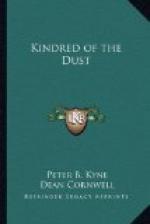For a long time now, he had felt a great urge to see Donald’s son. He had a curiosity to discover whether the child favored the McKayes or the Brents. If it favored the McKayes—well, perhaps he might make some provision for its future in his will, and in order to prove himself a good sport he would leave an equal sum to Nan’s illegitimate child, which Donald had formally adopted a few days after his marriage to Nan. Why make fish of one and fowl of the other? he thought. They were both McKayes now, in the sight of the law, and for aught he knew to the contrary they were full brothers!
The child became an obsession with him. He longed to weigh it and compare its weight with that of Donald’s at the same age—he had the ancient record in an old memorandum book at the office. He speculated on whether it had blue eyes or brown, whether it was a blond or a brunette. He wondered if Daney had seen it and wondering, at length he asked. Yes, Mr. Daney had seen the youngster several times, but beyond that statement he would not go and The Laird’s dignity forbade too direct a probe. He longed to throttle Mr. Daney, who he now regarded as the most unsympathetic, prosaic, dull-witted old ass imaginable.
He wanted to see that child! The desire to do so never left him during his waking hours and he dreamed of the child at night. So in the end he yielded and went down to the Sawdust Pile, under cover of darkness, his intention being to sneak up to the little house and endeavor to catch a glimpse of the child through the window. He was enraged to discover, however, that Nan maintained a belligerent Airedale that refused, like all good Airedales, to waste his time and dignity in useless barking. He growled—once, and The Laird knew he meant it, so he got out of that yard in a hurry.
He was in a fine rage as he walked back to the mill office and got into his car. Curse the dog! Was he to be deprived of a glimpse of his grandson by an insensate brute of a dog? He’d be damned if he was! He’d shoot the animal first—no, that would never do. Nan would come out and he would be discovered. Moreover, what right had he to shoot anybody’s dog until it attacked him? The thing to do would be to put some strychnine on a piece of meat—no, no, that would never do. The person who would poison a dog—any kind of a dog—
It was a good dog. The animal certainly was acting within its legal rights. Yes, he knew now where Nan had gotten it. The dog had belonged to First Sergeant Daniel J. O’Leary of the Fifth Marines; he had doubtless given it to Nan to keep for him when he went to the war; The Laird knew Dan thought a great deal of that dog. His name was Jerry and he had aided Dirty Dan in more than one bar-room battle.
Jerry, like his master, like the master of the woman he protected, was a Devil-dog, and one simply cannot kill a soldier’s dog for doing a soldier’s duty. Should Jerry charge there would be no stopping him until he was killed, so The Laird saw very clearly that there was but one course open to him. If he marched through that gate and straight to the door, as if he meant business, as if he had a moral and legal right to be there on business, Jerry would understand and permit him to pass. But if he snooped in, like a thief in the night, and peered in at a window—




